Many young people today face a significant challenge when it comes to finding employment. While there is ongoing discussion about labor shortages, the reality often feels quite different for job seekers. Despite submitting numerous applications and resumes, many never hear back, leaving them feeling overlooked and frustrated.

Recently, a young woman named Ash O’Brien took to TikTok to share her own struggles with securing a job. Ash, 23, had applied for a position at T.J. Maxx, but her application was rejected. Frustrated with the outcome, she decided to post a video about her experience, which quickly gained traction on social media. With over 97,000 followers on the platform, her story resonated with many people who have faced similar difficulties.
In her three-minute video, Ash shared her frustration about being turned down for the job. She explained, “I applied to T.J. Maxx a few weeks ago, and they rejected my application. I didn’t even get a phone call—just an automated email.” The impersonal nature of the rejection upset her, and rather than accepting it at face value, she decided to take matters into her own hands. She visited the store in person and asked to speak with a manager to get a clearer explanation for why she was not selected for the position.
When she finally spoke to a store manager, she was told that her application was rejected due to a lack of experience. The manager explained that they had chosen other candidates who were more qualified for the role. However, Ash wasn’t entirely convinced that this was the full story. She had her own suspicions about the reasons behind her rejection, particularly when it came to her personal appearance.
Ash specifically asked the manager whether her tattoos and piercings had influenced the hiring decision. In many workplaces, visible body art is still considered unprofessional, despite shifting cultural attitudes. She recounted, “I asked her if it was because of my tattoos since a lot of places still seem to frown upon them.” The manager, however, reassured her that her tattoos had nothing to do with the decision and that the rejection was purely based on experience.
@ashxobrien I want to know who is also having a hard time finding a job right now! #jobs #jobmarket ♬ original sound – Ash Putnam🩷🕸️
Despite the manager’s response, Ash remained doubtful. She had seen many instances where individuals with tattoos were passed over for job opportunities, even in industries where personal appearance shouldn’t be a major concern. While she chose not to press the issue further, the experience left her feeling disheartened.
Following this experience, Ash began to reflect on a broader issue—whether she was alone in facing these obstacles. She noted that in some European countries, individuals with tattoos and piercings seem to have an easier time finding employment compared to those in the United States. This observation led her to question whether American workplaces were still holding onto outdated biases about body modifications.
Her video quickly went viral, amassing over 8.5 million views and sparking widespread discussion. Thousands of viewers flooded the comments, with many expressing sympathy for her situation. Some shared their own experiences of being rejected from jobs despite being qualified, while others voiced their frustration with the hiring process in general.
A significant portion of the comments came from people who also have tattoos and supported Ash’s perspective. They felt that appearance should not dictate someone’s employability, especially for entry-level retail positions. Many agreed that the stigma surrounding tattoos in the workplace was outdated and unfair.
However, not everyone was on Ash’s side. Some commenters pointed out that her tattoos might have played a role in the hiring decision, even if the manager didn’t admit it outright. Others emphasized that companies have the right to decide how they want their employees to represent their brand.
One user commented, “It might not be fair, but businesses care about their image. If you’re interacting with customers, they want someone who looks ‘professional’ in their eyes.” Another wrote, “Public-facing jobs do have appearance policies, even if they don’t say it outright. It’s just reality.”
The debate revealed a deeper divide in how people perceive workplace standards and professionalism. While tattoos and piercings are becoming more socially acceptable, especially among younger generations, many employers still hold conservative views about appearance in the workplace. Some businesses fear that customers might judge employees based on their tattoos, leading to a potential loss in sales. Others simply adhere to longstanding policies that discourage visible body modifications.
Interestingly, some users who worked in hiring positions shared their own insights. One recruiter wrote, “I’ve hired people with tattoos before, but it depends on the industry. Corporate environments still hesitate, but in creative fields, it’s more accepted.” Another hiring manager mentioned, “We don’t have an official policy against tattoos, but we do consider how someone presents themselves. If a candidate doesn’t make an effort to look polished for an interview, that tells us something.”
Despite the mixed reactions, one thing was clear: Ash’s story struck a chord with many job seekers who have felt similarly rejected or judged. Her video highlighted how difficult the job search can be, especially for young people trying to gain experience in a competitive market. It also sparked important conversations about the evolving standards of professionalism and whether employers should be more open-minded when it comes to hiring individuals with tattoos and piercings.
As the job market continues to change, many believe that companies will eventually need to reconsider their stance on employee appearance. Younger generations, who are more likely to have tattoos than previous ones, are becoming a dominant force in the workforce. Some businesses have already started adapting their policies, recognizing that a person’s skills and work ethic matter far more than their physical appearance.
For Ash, the experience may have been disappointing, but it also served as a wake-up call about the realities of job hunting. She concluded her video by encouraging others to share their own experiences and push back against outdated hiring practices. “I just want to work and make a living,” she said. “I don’t think my tattoos should define whether I get a job or not.”
Her story serves as a reminder that while the job search process can be disheartening, persistence is key. As more people speak out about their experiences, workplaces may eventually be forced to evolve and embrace a more inclusive hiring approach.
Until then, job seekers like Ash will continue to navigate the challenges of finding employment in a world where appearance still plays a role—whether employers admit it or not.





